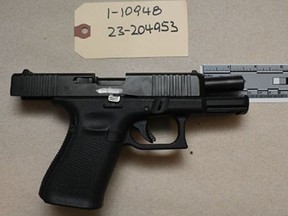
You can add police chiefs in Calgary, Peel, Durham, Brockville, North Bay and York Region to that of Toronto Police Chief Myron Demkiw in calling for bail reform in Canada.
The chiefs generally have the backing of their rank and file on this, as well, with the four largest police associations in Canada coming out last month to say enough is enough and something must be done on violent crime after a wave of police officer murders.
From our newsroom to your inbox at noon, the latest headlines, stories, opinion and photos from the Toronto Sun.
Thanks for signing up!
A welcome email is on its way. If you don't see it, please check your junk folder.
The next issue of Your Midday Sun will soon be in your inbox.
The police voices are joined by big city mayors and every premier in Canada, who are also calling for changes to the bail system to deal with repeat, violent offenders.
But what is really being asked here?
“The justice system fundamentally needs to keep anyone who poses a threat to public safety off the streets. And this starts with meaningful changes to the Criminal Code, an area solely within the federal government’s jurisdiction,” Canada’s premiers wrote to Prime Minister Justin Trudeau in mid-January.
While the premiers asked for reforms in general and expressed an interest to work with the federal government, they did make a specific request for a reverse onus bail conditions for anyone charged with “the offence of possession of a loaded prohibited or restricted firearm in Sec. 95 of the (Criminal) Code.” In a reverse onus situation, those accused of crimes are required to prove why they should be granted bail, as opposed to Crown prosecutors needing to prove why alleged criminals should be denied freedom, pending their trials.
Recommended video
Demkiw asked that the law be changed so that only judges, and not justices of the peace, be allowed to hear bail cases when serious gun charges are involved.
He also asked that that anyone who kills another person by firing a gun in a crowded setting be charged with first-degree murder, which carries a mandatory sentence of life in prison with no parole eligibility for 25 years. In addition, Demkiw wants judges sentencing anyone convicted for firing a gun in a congregate setting — such as a nightclub — to have the authority to require the guilty person to serve at least two-thirds of their sentence before being eligible for parole. In such cases, convicted criminals can now seek parole after serving one-third of their sentence.
The Trudeau government has said they are open to discussions, but that has been their position since provincial justice ministers raised the issue last March. Some provinces are now acting on their own, with Ontario Premier Doug Ford saying he will soon bring forward changes within his province.
In British Columbia, NDP Premier David Eby has been very critical of federal bail changes in Bill C-75 and called for problems to be fixed. In the meantime, his government is building response teams made up of police, prosecutors and probation officers to target repeat offenders.


